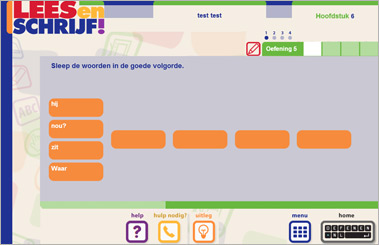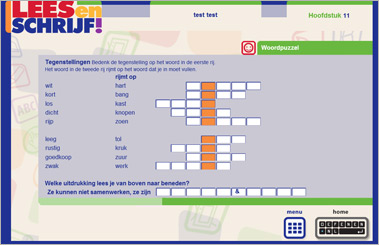

Opdrachtgever: Expertisecentrum Oefenen.nl
Project: Lees en Schrijf!
Project: Lees en Schrijf!
Client: Expertisecentrum Oefenen.nl
Project: Read and Write!
Project: Read and Write!
Lees en Schrijf!
Read and Write!
'Lees en Schrijf!' is een laagdrempelige, leuke en effectieve manier voor een groot deel van de 1,5 miljoen laaggeletterde volwassenen in Nederland om te leren omgaan met alledaagse schrijf- en leestaken. 'Lees en Schrijf!' is geen lesmethode. Potentiele cursisten worden gestimuleerd en gemotiveerd. De landelijke aftrap vond plaats op 5 maart 2007.
Emmia ontwikkelde de oefenwebsite in opdracht van Stichting Expertisecentrum ETV.nl.
Multimedia
Bijzonder is de multimediale aanpak van 'Lees en Schrijf!'.
Die bestaat uit:
In het werkboek kunnen kijkers verder oefenen met de lees- en schrijftips uit de televisieserie. De hoofdstukken sluiten aan bij de afleveringen, maar de oefeningen kunnen ook los worden gemaakt. Verder staat op de website meer informatie en kunnen de afleveringen bekeken worden. Mensen kunnen de gratis hulptelefoon bellen voor informatie over een cursus in de buurt of om het gratis werkboek aan te vragen. Als ze vragen hebben over de oefeningen in het werkboek of op de website worden ze doorverbonden met een docent.
Onderwerpen
'Lees en Schrijf!' gaat over alledaagse woon-, en werksituaties met speciale aandacht voor zaken die met ICT te maken hebben, zoals bijvoorbeeld internetbankieren, sms-en en e-mail. Iedere aflevering en hoofdstuk heeft een thema uit de alledaagse praktijk: wonen, voeding, gezondheid, reizen, opvoeding, sport, enzovoort.
Doel
‘Lees en Schrijf!’ heeft als doel laaggeletterden te motiveren om aan de slag te gaan met hun lees- en schrijfvaardigheid en de weg naar het cursusaanbod NT1 op het ROC alsnog in te slaan.
Voor wie is 'Lees en Schrijf!'?
'Lees en Schrijf!' is bedoeld voor mensen die moeite hebben met lezen en schrijven. Voor mensen die wel hun eigen naam kunnen schrijven, maar moeite hebben met veel dagelijkse lees- en schrijftaken. Het gaat om ouderen en jongeren, mannen en vrouwen, werkenden en niet-werkenden, autochtone volwassenen en volwassenen van wie Nederlands niet de moedertaal is, maar die het wel goed spreken, stad- en plattelandbewoners, volwassenen met en zonder kinderen. In Nederland zijn 1,5 miljoen mensen analfabeet.
Emmia ontwikkelde de oefenwebsite in opdracht van Stichting Expertisecentrum ETV.nl.
Multimedia
Bijzonder is de multimediale aanpak van 'Lees en Schrijf!'.
Die bestaat uit:
- televisieserie
- werkboek
- website
- hulptelefoon
- promotiecampagne
In het werkboek kunnen kijkers verder oefenen met de lees- en schrijftips uit de televisieserie. De hoofdstukken sluiten aan bij de afleveringen, maar de oefeningen kunnen ook los worden gemaakt. Verder staat op de website meer informatie en kunnen de afleveringen bekeken worden. Mensen kunnen de gratis hulptelefoon bellen voor informatie over een cursus in de buurt of om het gratis werkboek aan te vragen. Als ze vragen hebben over de oefeningen in het werkboek of op de website worden ze doorverbonden met een docent.
Onderwerpen
'Lees en Schrijf!' gaat over alledaagse woon-, en werksituaties met speciale aandacht voor zaken die met ICT te maken hebben, zoals bijvoorbeeld internetbankieren, sms-en en e-mail. Iedere aflevering en hoofdstuk heeft een thema uit de alledaagse praktijk: wonen, voeding, gezondheid, reizen, opvoeding, sport, enzovoort.
Doel
‘Lees en Schrijf!’ heeft als doel laaggeletterden te motiveren om aan de slag te gaan met hun lees- en schrijfvaardigheid en de weg naar het cursusaanbod NT1 op het ROC alsnog in te slaan.
Voor wie is 'Lees en Schrijf!'?
'Lees en Schrijf!' is bedoeld voor mensen die moeite hebben met lezen en schrijven. Voor mensen die wel hun eigen naam kunnen schrijven, maar moeite hebben met veel dagelijkse lees- en schrijftaken. Het gaat om ouderen en jongeren, mannen en vrouwen, werkenden en niet-werkenden, autochtone volwassenen en volwassenen van wie Nederlands niet de moedertaal is, maar die het wel goed spreken, stad- en plattelandbewoners, volwassenen met en zonder kinderen. In Nederland zijn 1,5 miljoen mensen analfabeet.
'Read and Write!' is an accessible, fun and effective way for a large part of the 1.5 million low-literate adults in the Netherlands to learn to deal with everyday writing and reading tasks. 'Read and Write!' is not a teaching method. Potential students are stimulated and motivated. The national kick-off took place on March 5, 2007.
Emmia developed the practice website on behalf of the ETV.nl Expertise Center Foundation.
Multimedia
The multimedia approach of 'Read and Write!' is special.
It consists of:
In the workbook, viewers can further practice with the reading and writing tips from the television series. The chapters are linked to the episodes, but the exercises can also be separated. There is also more information on the website and the episodes can be viewed. People can call the toll-free helpline for information about a course nearby or to request the free workbook. If they have questions about the exercises in the workbook or on the website, they will be connected to a teacher.
Topics
'Read and Write!' is about everyday living and working situations with special attention to matters related to ICT, such as internet banking, texting and e-mail. Each episode and chapter has a theme from everyday practice: living, nutrition, health, travel, education, sports, etc.
Purpose
The aim of 'Read and Write!' is to motivate low-literate people to get started with their reading and writing skills and to take the path to the NT1 course offering at the ROC.
Who is 'Read and Write!' for?
'Read and Write!' is intended for people who have difficulty reading and writing. For people who can write their own name, but have difficulty with many daily reading and writing tasks. This concerns elderly and young people, men and women, working and non-working people, native adults and adults whose mother tongue is not Dutch, but who speak it well, city and rural residents, adults with and without children. In the Netherlands, 1.5 million people are illiterate.
Emmia developed the practice website on behalf of the ETV.nl Expertise Center Foundation.
Multimedia
The multimedia approach of 'Read and Write!' is special.
It consists of:
- television series
- workbook
- website
- assistance phone
- promotional campaign
In the workbook, viewers can further practice with the reading and writing tips from the television series. The chapters are linked to the episodes, but the exercises can also be separated. There is also more information on the website and the episodes can be viewed. People can call the toll-free helpline for information about a course nearby or to request the free workbook. If they have questions about the exercises in the workbook or on the website, they will be connected to a teacher.
Topics
'Read and Write!' is about everyday living and working situations with special attention to matters related to ICT, such as internet banking, texting and e-mail. Each episode and chapter has a theme from everyday practice: living, nutrition, health, travel, education, sports, etc.
Purpose
The aim of 'Read and Write!' is to motivate low-literate people to get started with their reading and writing skills and to take the path to the NT1 course offering at the ROC.
Who is 'Read and Write!' for?
'Read and Write!' is intended for people who have difficulty reading and writing. For people who can write their own name, but have difficulty with many daily reading and writing tasks. This concerns elderly and young people, men and women, working and non-working people, native adults and adults whose mother tongue is not Dutch, but who speak it well, city and rural residents, adults with and without children. In the Netherlands, 1.5 million people are illiterate.


